Here are a few of my favourite things in 2023

2023 was a challenging year for many, many obvious reasons—from a continuing pandemic to the collapse of games journalism and massive games industry layoffs. But, it was also a tremendous year for media, with an avalanche of incredible books, games, films, TV shows, and everything in between.
If you want to see my best work from the year, you check out my year in review/eligibility post. But, here I want to focus on highlighting some of my favourite things of the year—from R.F. Kuang’s books to my skateboard and Analogue Pocket, incredible podcasts and newsletters, cozy fantasies, video game histories, a new Makoto Shinkai film, and retro throwback RPGs. It’s got a little bit of something for everyone.
Let’s go!
Books
Babel by R.F. Kuang
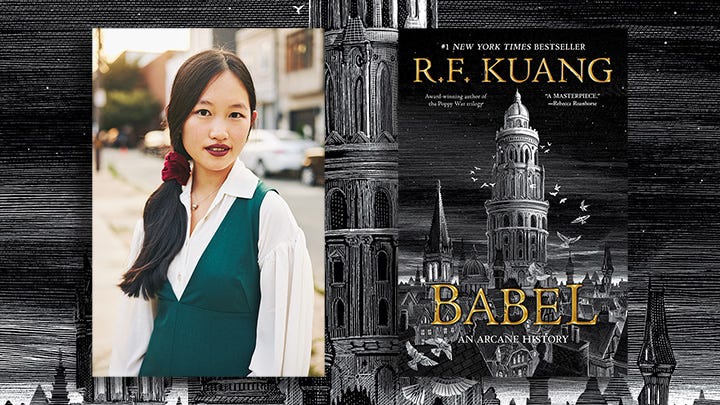
For as much as I’d heard about Kuang’s debut fantasy trilogy, starting with The Poppy War, Babel was my introduction to her work. I was blown away by its breadth and scope, heady ideas, while also being compulsively readable. It’s a big, chunky book, but the pages fly by as it explores identity and colonialism, the balance of power, the culpability of those supported by the machine. See my full review.
Jonathan Abernathy You Are Kind by Molly McGhee
Molly McGhee’s Jonathan Abernathy You Are Kind and it’s a marvel! Funny, deep, razor-sharp takedown of late stage capitalism with one of my favourite protagonists I’ve met in a long time. It has the satirical absurdity of Vonnegut at his best, but with the modern perspective of growing up under our particular flavour of late stage capitalism. The best stories are about ordinary people doing extraordinary things, and Jonathan Abernathy is as ordinary as they come, and his story is more extraordinary, and heartbreaking, than you can imagine. Get Jonathan Abernathy You Are Kind by Molly McGhee.
Ducks by Kate Beaton
Careful and detailed, broad ranging, achingly familiar, and touchingly personal, Ducks tells a deeply Canadian tale that still manages to be universal. It’s a story about the perils of capitalism, and the many ways humanity is imprisoned by the short term thinking of fabulously wealthy and dangerous corporations who care nothing for the people and communities that generate their profit—or their future. Read my full review.
Video Game of the Year by Jordan Minor
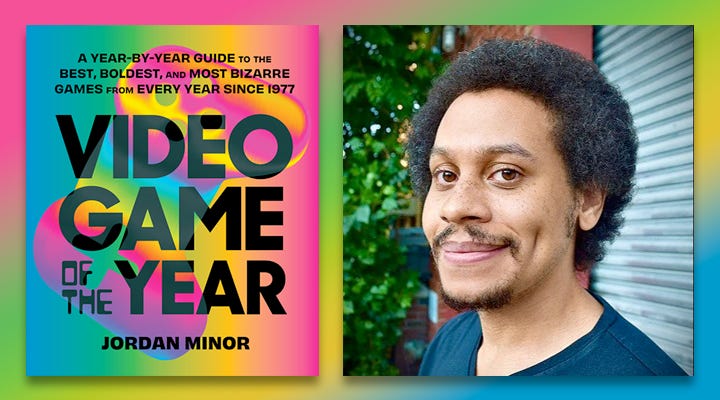
I love me some video game history, and Jordan Minor’s Video Game of the Year takes readers on a journey through 40 years of highlights. Though Minor’s choices don’t always align with mine, he’s got a compelling voice and sharp understanding of each title’s impact on games history and argues their case well. To top it off, he invited many of my favourite games journalists to contribute their own thoughts on dozens of other games along the way. A delight from cover-to-cover. Read my full review.
The Labyrinth of the Spirits by Carlos Ruiz Zafon
Alongside Tolkien’s The Hobbit, my favourite book of all time is Carlos Ruiz Zafon’s magical coming-of-age adventure The Shadow of the Wind. Zafon followed that with two wildly different sequels, to varying degrees of success, each failing to capture the magic of the original book. The Labyrinth of the Spirits, the fourth and final book in the series, is a monstrously long conclusion to the events that began with The Shadow of the Wind, and neatly, impressively, ties together the events from its sequels in a way that felt natural and helped me understand why Zafon took such a left turn with the middle of the series in the first place. Get The Labyrinth of the Spirits by Carlos Ruiz Zafon.
Metal Gear Solid by Ashly and Anthony Burch
One of the things I love about Boss Fight Books is that they give their authors free reign for how they approach writing about whichever game they’re covering. Some, like Chris Kohler’s Final Fantasy V, are rooted in a mix of journalistic reporting and personal storytelling, others, like Alex James Kane’s Knights of the Old Republic, lean more heavily toward reporting and interviews. Metal Gear Solid by brother/sister co-writers Ashly and Anthony Burch is a full-on personal reflection of Metal Gear Solid’s significance to their experience as avid video game fans. As a reader, I couldn’t put it down, and laughed out loud many times thanks to the genuine chemistry and natural sibling humour shared by the two (usually in the brilliant footnotes) and as a writer I learned a lot about how to inject personal storytelling into games criticism. Get Metal Gear Solid by Ashly and Anthony Burch.
Bookshops & Bonedust by Travis Baldree
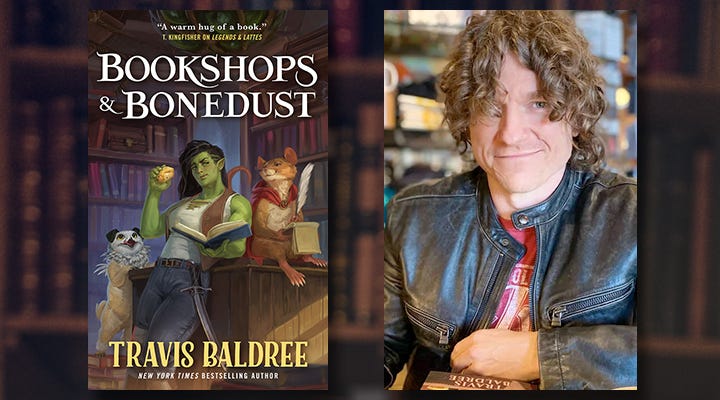
Travis Baldree’s breakout debut Legends & Lattes deserved all its hype and success thanks to a refreshingly cozy story focused on small stakes and personal stories. Still, in many ways it featured the rough edges of a debut. Its follow-up prequel, Bookshops & Bonedust, smooths these down while retaining all the cozy vibes within a more structurally sound and ambitious plot. Bookshops & Bonedust proved not only that Travis Baldree wasn’t a one trick pony, but he’s only getting better. Read my full review.
Yellowface by R.F. Kuang
The second Kuang book on this list, Yellowface, couldn’t be more different from the first, but further cements Kuang as one of the brightest must-read writers publishing today. Witty and devastating, incisive and thoughtful, Yellowface had me constantly nodding my head along with its brutal depiction of being a writer, and also looking hard in the mirror as I recognized many qualities shared between my positions and privileges as a white writer and those of the novel’s narrator/antagonist June Hayward. An eye opener and a page turner all in one. Read my full review.
Exile by R.A. Salvatore
Late last year, I finished R.A. Salvatore’s Coven trilogy, enjoying the climactic final novel, Song of the Risen God, so much that I was inspired to return to the author’s back catalogue while I waited for his continuation of the DemonWars series with 2024’s Pinquickle’s Folly. I’ve always considered Salvatore’s 1990 Forgotten Realms novel Homeland—which reveals the origins of his famous drow ranger, Drizzt—to be a genre classic, but returning to it, I found myself put off by the relentlessly grim drow society and endless cast of characters that just want to fuck everything up. It wasn’t a bad book; rather the wrong book for me at the time. Still, I picked up the second volume, Exile, which I remembered being soft on back when I first read it. Surprisingly, I enjoyed it immensely, far more than Homeland this time around.. The shift from major politicking to more of a standard D&D romp through the Underdark provided a tense and fun read, and it really helped me remember why I loved the Drizzt books so long ago.
Video games
Sea of Stars
Sea of Stars has been my most anticipated game for years, and I’ve written about it several times—including as a main driver in a latter chapter of my book, Fight, Magic, Items, for its role as a western-created RPG heavily inspired by classic Japanese games like Illusion of Gaia and Chrono Trigger. It’s an audiovisual masterpiece, with top-of-class pixel art and music, and while the storytelling and writing aren’t as tight as I’d have liked, I enjoyed my journey to some seriously unexpected places, and Garl is an S-Tier companion. All around, despite years of anticipation, Sea of Stars blew me away.
Viewfinder
I love me a good walking simulator, and Viewfinder mixes that relaxed genre with some truly mind bending puzzling and navigation elements unlike anything I’ve seen in a game before. I wasn’t always taken by the narrative elements, which are often my favourite parts of walking simulators like Firewatch, What Remains of Edith Finch, and Gone Home, but the increased emphasis on puzzle solving, and the game’s main mechanic, which I won’t spoil here, more than made up for it. An experience I won’t soon forget.
Super Mario RPG
Like Link’s Awakening before it, Super Mario RPG is a pitch perfect Switch remake of one of my all-time favourite games. Unlike more dramatic remakes, such as Final Fantasy VII Remake, Super Mario RPG focuses on retaining as much of the original game as possible, while adding appreciated on quality of life improvements (like quick travel, a revamped inventory system, and new combo attacks) and a slick new coat of paint. It’s as charming as ever, and one of the few remakes that, in my opinion, makes the original more or less obsolete.
Pokémon Trading Card Game
When I got my Analogue Pocket, I enjoyed a quick playthrough of Link’s Awakening and Metroid: Zero Mission, a couple of all time favourites, but the game that really surprised me was the Game Boy Colour’s Pokemon Trading Card Game. I started it on a whim, and then couldn’t put it down until I was champion. A faithful rendition of the card game, the interface/gameplay is surprisingly effective and simple for a Game Boy game. While it’s irritating trying to collect the specific cards you need to make a deck (I was never able to complete a full Blastoise Rain Dance deck, despite beating the game after 12+ hours), the non-linear progression and moment-to-moment gameplay loop of playing matches, winning booster packs, and improving your decks remained addictive the whole way through.
Astro’s Playroom
A creative, meticulously designed, and charming action platformer based on… PlayStation history? I wouldn’t have believed you before I got a PlayStation 5 earlier this year, but Astro’s Playroom is brilliant. Packed-in with all PS5 consoles, Astro’s Playroom was a genuine surprise, a technical marvel, and easily one of the best modern platformers available. I need more.
NieR: Automata
The original NieR is one of my all-time favourite games—just an ultra janky, weird, and uncomfortable piece of perfection that fit perfectly into a hole in my soul I didn’t know existed until it was filled. It took me years to get around to its universally lauded sequel NieR: Automata because how could it possibly live up to my expectations? But, after the release of NieR Replicant ver.1.22474487139..., a modern-gen remaster of the original game, I decided it was finally time to rip off the band-aid, and, well, I wasn’t disappointed. Evocative, intelligent, and satisfying, NieR: Automata is Yoko Taro at his finest. Even if its post-apocalyptic sci-fi setting didn’t resonate with me as much as the original’s post-apocalyptic fantasy setting, it’s stuck with me long after rolling (all!) the credits, and takes the original games’s themes in new, unexpected ways.
The Forgotten City
Explore a hidden Roman city where any breach of the law results in the city’s entire population being turned to gold? A time-loop mystery that encourages players to suss out clues, engage in deep dialogue trees, and cleverly unravel the cause of the city’s exile and gilded doom? The Forgotten City is unlike anything else I’ve played, and well worth a few days of adventuring to plumb its evocative setting and satisfying secrets.
Chained Echoes
Like Sea of Stars, Chained Echoes is a throwback western-created RPG that wears its golden age JRPG influences on its sleeve. Clearly calling back to games like Xenogears and Suikoden, Chained Echoes, developed largely by a single person, still manages to feel like its own thing with a fun take on combat, a genuinely riveting story, and a memorable cast of main characters. While it doesn’t quite hit Sea of Stars’ audiovisual heights, that it comes enters the discussion (considering the comparative size of development teams and resources) is nothing short of remarkable.
Everything Else
Retrograde Amnesia
A couple years ago, I wrote a piece for WIRED called “Move Over, Oprah. Video Game Book Clubs Have Arrived” about fans gathering in book club-style communities focused on retro video games. At the centre of that piece is a podcast called Retrograde Amnesia, and it’s gone on to become one of my go-to podcasts. What began as a chapter-by-chapter deep dive into Square’s 1998 epic Xenogears has become a rich, thoughtful exploration of RPG history, which is, of course, right up my alley.
Subject matter is one thing, but a good podcast needs a good voice, and this is where Chris Stone and Eric Layman really shine. Knowledgeable and funny, the two are longtime friends and have perfectly contrasting personalities that play off each other to amusing effect. When I was writing Fight, Magic, Items, I specifically wanted it to feel like you were sitting at a bar with your best friend, sharing a drink, and chatting about your favourite games from childhood. Layman and Stone nail this vibe, and every episode feels like a meeting between you and your two besties.
Coincidentally, they have a perfect episode for newcomers, which just happens to be a lengthy interview with me, your dear author, about my book, Fight, Magic, Items.
The Bear
Does the perfect TV show exist? The Bear gives me reason to believe. From its incredible cast, intricate writing, and absolute refusal to settle into predictability, The Bear is a riveting, thoughtful, and oftentimes tense look at the culinary world and its people. The first season is the perfect set up, as world class chef Carmy returns to save his family’s greasy spoon restaurant from failure, with the seventh episode being one of the best TV episodes of all time, but season two, as Carmy and crew convert the sandwhich shop into a fine dining restaurant, and its various characters get their own episodes, showcases The Bear’s incredible depth and range. It is perfect television.
Game Maker’s Toolkit
I don’t make video games, but I’d like to. Mark Brown’s Game Maker’s Toolkit is a comprehensive, easily digestible look at the tech and craft behind our favourite video games. Brown’s grasp on video game design is thorough and delivered in a way that’s approachable for anyone interested in game design, and his own journey to create a game from scratch has been a fascinating lesson in how to learn a new skill. Highly recommended whether you’re actively into making video games, or just curious about how they’re made and designed. I learn something new with every video.
Analogue Pocket
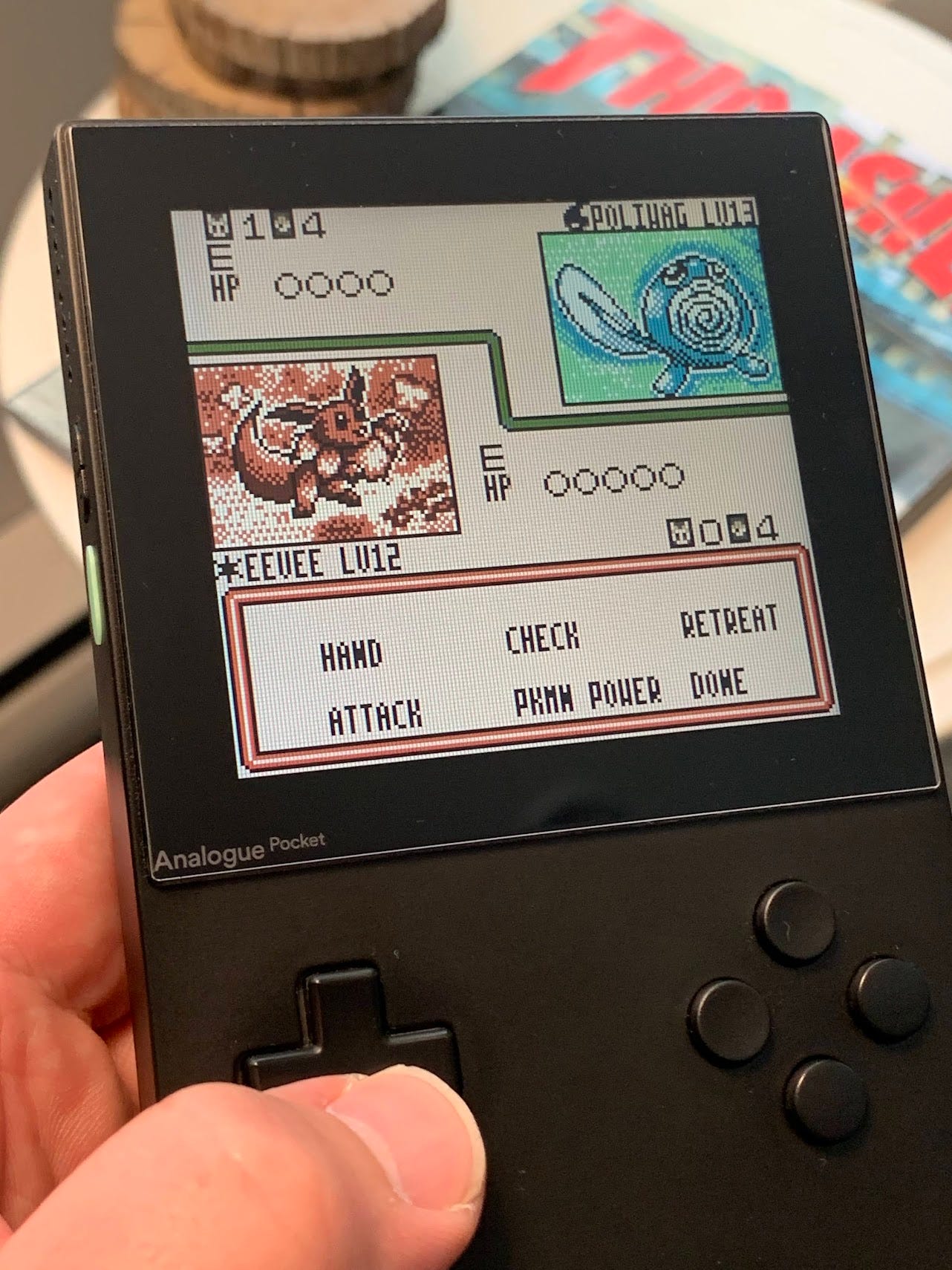
After waiting 18+ months for my Analogue Pocket to arrive, my enthusiasm for the company was at an all-time low, but the device itself blew away my expectations. I have a large library of Game Boy games, and being able to revisit those on the gorgeous screen, complete with high quality, faithful screen filters that emulate the look of old devices, is nothing short of revolutionary and has breathed new life into many of my favourite games. Analogue seems to be getting its act together as of the beginning of 2024, with Analogue Pocket devices available to order seemingly at will now, and a recent OS update that added some great new features, so I’m cautiously optimistic for what the future holds for Analogue devices.
My Perfect Console
My Perfect Console? More like My Perfect Concept.
Long-time games journalist Simon Parkin invites games industry professionals—from developers and directors to artists, journalists, and historians—to assemble five video games for their “perfect console.” What follows is erudite conversation between Parkin (an excellent interviewer) and his guests, often veering off the beaten track to learn about the guests and their journey through video games. It’s enchanting, and I can’t get enough.
Crossplay
One of the absolute joys of parenthood is discovering new games and old favourites with my kids. Whether it was Animal Crossing during the depths of the pandemic, the Kero Sewers in Super Mario RPG freaking out my 9yo, or watching the way my two kids approach Unpacking from entirely different angles, gaming with my kids is a joy—but can also be challenging as they adapt to the complexity of modern games compared to the ones I grew up playing. ’s brilliant newsletter explores the intersection between gaming and parenthood, and provides perspective and wisdom for all those gaming moms and dads out there, filling a valuable niche left empty by mainstream games journalism.
My skateboard
So many of my hobbies revolve around sitting around consuming or creating media, so last spring, I decided to revisit a vice from my youth and bought a skateboard from a kid who was saving up for a PlayStation 5. It… went better than you might have expected, and it’s been a joy relearning how to ride, cruising around the skatepark with my kids, and generally having fun while looking foolish. In Astrolabe 33, I wrote about how stuff like skateboarding, and video games, etc., are often pigeonholed as being “for kids” due in large part because of how and when they were popularized.
The Nine Club
Adding to my rediscovery of skateboarding has been The Nine Club, a podcast hosted by Chris Roberts and his aging skateboarding friends Kelly Hart and Jeron Wilson, as they discuss the sport, the culture, and the people of skateboarding. Every episode they bring on a guest—from Jason Lee to Chad Muska and Breana Geering—and the breadth and depth of the discussions is always fascinating. Skateboarding’s for old folks, too, y’all.
ROBLOX_OOF.mp3
As a lefty heathen, it’s no surprise I’m a fan of hbomberguy’s YouTube videos. He’s covered stuff like climate change denial, the appeal of speedrunning, and the war* on Christmas. But nothing—nothing!—could prepare me for his December, 2022 video, “ROBLOX_OOF.mp3.” What begins as an exploratory essay on the origins of a silly meme soundbite from Roblox tumbles into a two hour long takedown of “veritable video game industry icon” Tommy Tallarico. It goes places. Then keeps going, and, well, you’ve just gotta watch. I can’t find time to watch a film these days, but I was absolutely riveted for its entire two hour runtime thanks to hbomberguy’s abundant research, trademark humour, and ability to unravel the world’s shittiest people.
Suzume
I only discovered Makoto Shinkai’s work a couple of years ago, but his 2016 fantasy/romance Your Name immediately shot into my top five favourite films of all time, and I’ve eagerly devoured his other work since. So, my anticipation for Suzume was through the roof. After liking but not loving Shinkai’s 2019 follow up to Your Name, Weathering With You, I was pleased to find that Suzume is another crowning achievement for the Japanese filmmaker. Beautiful and funny, like all his films, it also ratchets up the scope tremendously, becoming, in many ways, a strange but effective mixture of coming-of-age romance and Japanese kaiju. It’s not quite the transformative experience I discovered with Your Name, but a lot of that had to do with expectations and surprise. Suzume is a brilliant addition to Shinkai’s filmography, and especially for Ghibli fans who will no doubt recognize many homages to the legendary Hayao Miyazaki’s films.
The Video Game History Foundation
After writing a history book about video games, and covering the industry’s history in my freelance journalism, I am, I suppose, if you squint, a video game historian. For my money, there’s nobody out there doing god’s work quite like the Video Game History Foundation and their mission to preserve the history of the video game industry and its people. Their upcoming VGHF Library (see video above) will be revolutionary for writers like me. The future of video game history is looking bright.
Frieren: Beyond Journey's End
I’m a sucker for epic fantasy tropes, and Frieren: Beyond Journey's End takes one of my favourites—an adventuring party on a quest to take down the evil lord—and spins it on its head. Instead of following the party’s journey from the beginning, Frieren starts after the end, joining the Elven mage Frieren and her friends after they’ve defeated the Demon King. Per usual with Elves, Frieren lives much longer than her friends, however, and after their victory, she marches on, ageless, while her companions grow old without her realizing it. Frieren explores companionship, grief, and purpose through a protagonist endowed with a surprising degree of naivety and melancholic humour.
It’s available to stream on Crunchyroll.
Critical Distance
Late in 2023, games journalists, including myself, were miffed and more than a little annoyed by the press surrounding a non-fiction essay collection called Critical Hits. The concept for the book—to get mainstream writers to write about video games—was fine, but the run-up to the book and some of its contents perpetuated the myth that serious games writing has no home. But, of course, games writing doesn’t need mainstream writers to save it, and, since 2009, Critical Distance has been collecting the best games journalism out there for weekly digests that prove great games writing is everywhere. Further, they emphasize smaller sites and publications, leading to a broad and diverse range of writers and topics.
In 2023, 589 articles by 292 writers at 140 different websites were included in Critical Distance’s weekly and monthly roundups. Yes, the big sites like IGN and GameSpot all made appearances, but overwhelmingly we heard from small and midsize independent outlets, researchers specializing in particular areas of game studies and videogame history, and dozens upon dozens of individual bloggers whose desire to engage critically with games on their own terms shone through extremely brightly. Even as things seem like they’re at their darkest, hundreds of flowers have bloomed in that twilight.
It’s a fabulous resource, and one of my weekly go-to spots—and not just because my Washington Post piece, “How the greatest Japanese RPGs of the ‘90s came to the West,” made their Best Games Criticism of 2023 list, either!
Now, jump in the comments and let me know what you enjoyed in 2023!
Support
There are lots of ways to support Astrolabe and my other work. Check ‘em out!
Keep In Touch
Enjoy Astrolabe? Want more SFF and retro gaming goodies? You can find me on Twitter and my website.
Credits
Astrolabe banner photo by Shot by Cerqueira on Unsplash

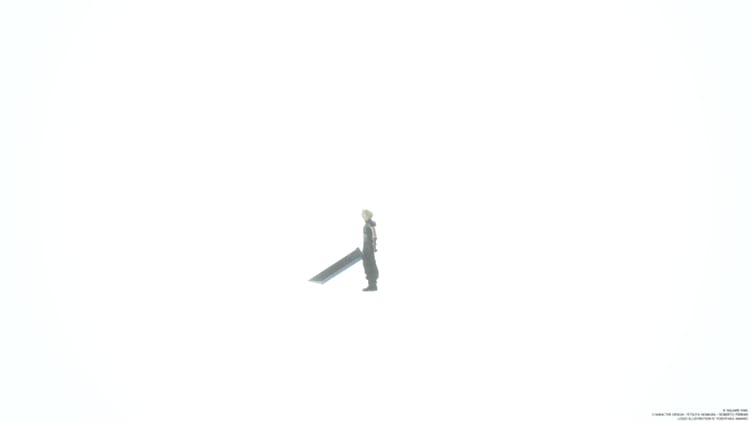

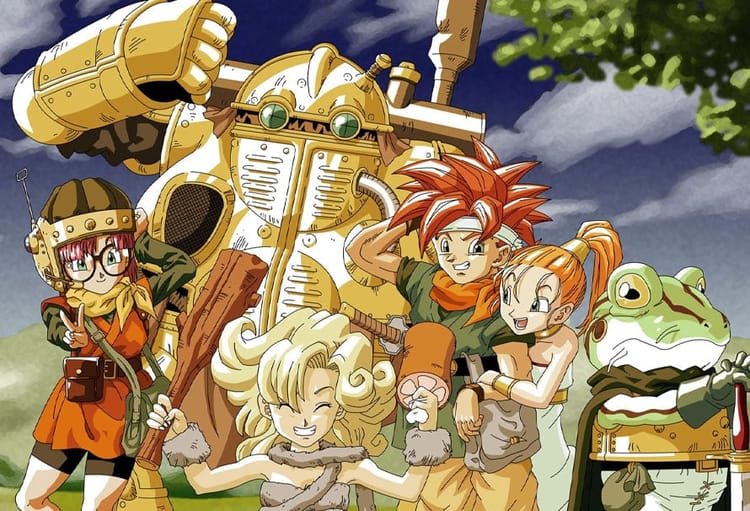
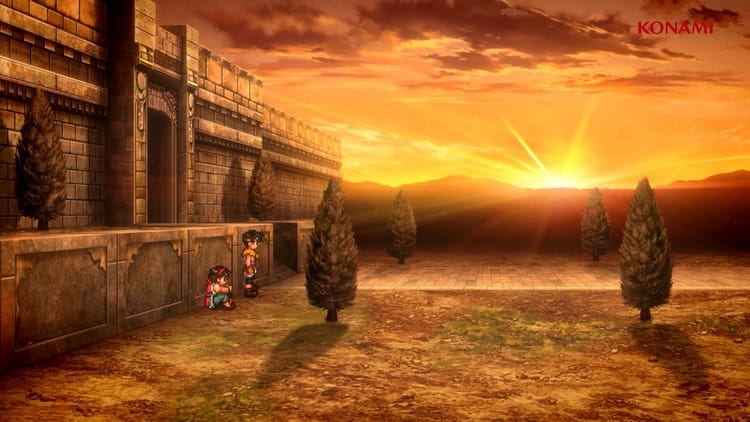
Member discussion